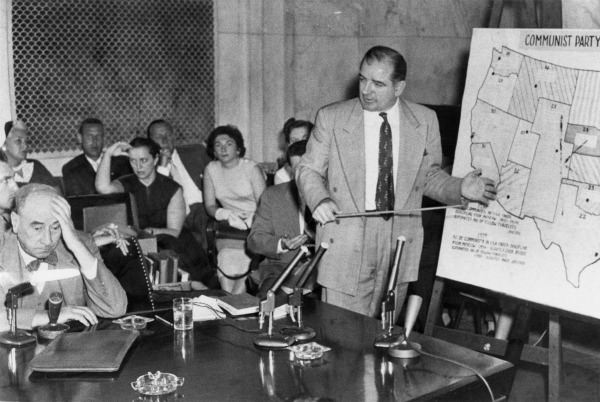About American Anti-communism
Wisconsin Republican senator Joseph R. McCarthy rocketed to public attention in 1950 with his allegations that hundreds of Communists had infiltrated the State Department and other federal agencies. These charges struck a particularly responsive note at a time of deepening national anxiety about the spread of world communism.

McCarthy relentlessly continued his anticommunist campaign into 1953, when he gained a new platform as chairman of the Senate Permanent Subcommittee on Investigations. He quickly put his imprint on that subcommittee, shifting its focus from investigating fraud and waste in the executive branch to hunting for Communists. He conducted scores of hearings, calling hundreds of witnesses in both public and closed sessions.
A dispute over his hiring of staff without consulting other committee members prompted the panel's three Democrats to resign in mid-1953. Republican senators also stopped attending, in part because so many of the hearings were called on short notice or held away from the nation's capital. As a result, McCarthy and his chief counsel Roy Cohn largely ran the show by themselves, relentlessly grilling and insulting witnesses. Harvard law dean Ervin Griswold described McCarthy's role as "judge, jury, prosecutor, castigator, and press agent, all in one."
In the spring of 1954, McCarthy picked a fight with the U.S. Army, charging lax security at a top-secret army facility. The army responded that the senator had sought preferential treatment for a recently drafted subcommittee aide. Amidst this controversy, McCarthy temporarily stepped down as chairman for the duration of the three-month nationally televised spectacle known to history as the Army-McCarthy hearings.
The army hired Boston lawyer Joseph Welch to make its case. At a session on June 9, 1954, McCarthy charged that one of Welch's attorneys had ties to a Communist organization. As an amazed television audience looked on, Welch responded with the immortal lines that ultimately ended McCarthy's career: "Until this moment, Senator, I think I never really gauged your cruelty or your recklessness." When McCarthy tried to continue his attack, Welch angrily interrupted, "Let us not assassinate this lad further, senator. You have done enough. Have you no sense of decency?"
Overnight, McCarthy's immense national popularity evaporated. Censured by his Senate colleagues, ostracized by his party, and ignored by the press, McCarthy died three years later, 48 years old and a broken man.
June 9, 1954
For more information: U.S. Congress. Senate. Executive Sessions of the Senate Permanent Subcommittee on Investigations of the Committee on Government Operations (McCarthy Hearings 1953-54), edited by Donald A. Ritchie and Elizabeth Bolling. Washington: GPO, 2003. S. Prt. 107-84. Available online.
#USA #US #anticommunism #antisoviet #american #propaganda #mccarthyism #mindmanipulation #frauds #coldwar

McCarthy relentlessly continued his anticommunist campaign into 1953, when he gained a new platform as chairman of the Senate Permanent Subcommittee on Investigations. He quickly put his imprint on that subcommittee, shifting its focus from investigating fraud and waste in the executive branch to hunting for Communists. He conducted scores of hearings, calling hundreds of witnesses in both public and closed sessions.
A dispute over his hiring of staff without consulting other committee members prompted the panel's three Democrats to resign in mid-1953. Republican senators also stopped attending, in part because so many of the hearings were called on short notice or held away from the nation's capital. As a result, McCarthy and his chief counsel Roy Cohn largely ran the show by themselves, relentlessly grilling and insulting witnesses. Harvard law dean Ervin Griswold described McCarthy's role as "judge, jury, prosecutor, castigator, and press agent, all in one."
In the spring of 1954, McCarthy picked a fight with the U.S. Army, charging lax security at a top-secret army facility. The army responded that the senator had sought preferential treatment for a recently drafted subcommittee aide. Amidst this controversy, McCarthy temporarily stepped down as chairman for the duration of the three-month nationally televised spectacle known to history as the Army-McCarthy hearings.
The army hired Boston lawyer Joseph Welch to make its case. At a session on June 9, 1954, McCarthy charged that one of Welch's attorneys had ties to a Communist organization. As an amazed television audience looked on, Welch responded with the immortal lines that ultimately ended McCarthy's career: "Until this moment, Senator, I think I never really gauged your cruelty or your recklessness." When McCarthy tried to continue his attack, Welch angrily interrupted, "Let us not assassinate this lad further, senator. You have done enough. Have you no sense of decency?"
Overnight, McCarthy's immense national popularity evaporated. Censured by his Senate colleagues, ostracized by his party, and ignored by the press, McCarthy died three years later, 48 years old and a broken man.
June 9, 1954
For more information: U.S. Congress. Senate. Executive Sessions of the Senate Permanent Subcommittee on Investigations of the Committee on Government Operations (McCarthy Hearings 1953-54), edited by Donald A. Ritchie and Elizabeth Bolling. Washington: GPO, 2003. S. Prt. 107-84. Available online.
#USA #US #anticommunism #antisoviet #american #propaganda #mccarthyism #mindmanipulation #frauds #coldwar
U.S. Senate: "Have You No Sense of Decency?"
1941: Have You No Sense of Decency? -- June 9, 1954www.senate.gov
Dieser Beitrag wurde bearbeitet. (12 Monate her)
techriot Posting with Hubzilla mag das.

kuchinster •